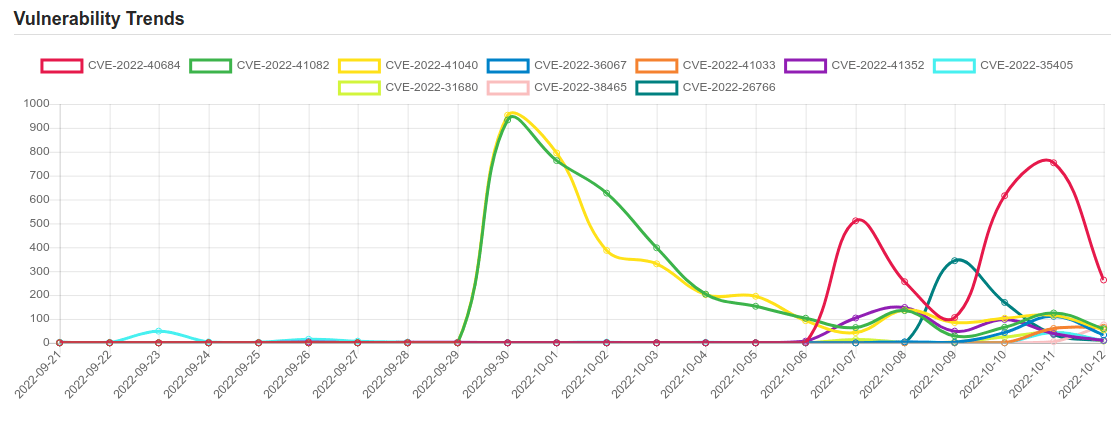Daily Vulnerability Trends: Thu Oct 13 2022

| CVE NAME | CVE Description |
| CVE-2022-31680 | The vCenter Server contains an unsafe deserialisation vulnerability in the PSC (Platform services controller). A malicious actor with admin access on vCenter server may exploit this issue to execute arbitrary code on the underlying operating system that hosts the vCenter Server. |
| CVE-2022-38465 | A vulnerability has been identified in SIMATIC Drive Controller family (All versions < V2.9.2), SIMATIC ET 200SP Open Controller CPU 1515SP PC (incl. SIPLUS variants) (All versions), SIMATIC ET 200SP Open Controller CPU 1515SP PC2 (incl. SIPLUS variants) (All versions < V21.9), SIMATIC S7-1200 CPU family (incl. SIPLUS variants) (All versions < V4.5.0), SIMATIC S7-1500 CPU family (incl. related ET200 CPUs and SIPLUS variants) (All versions < V2.9.2), SIMATIC S7-1500 Software Controller (All versions < V21.9), SIMATIC S7-PLCSIM Advanced (All versions < V4.0). Affected products protect the built-in global private key in a way that cannot be considered sufficient any longer. The key is used for the legacy protection of confidential configuration data and the legacy PG/PC and HMI communication. This could allow attackers to discover the private key of a CPU product family by an offline attack against a single CPU of the family. Attackers could then use this knowledge to extract confidential configuration data from projects that are protected by that key or to perform attacks against legacy PG/PC and HMI communication. |
| CVE-2022-26766 | A certificate parsing issue was addressed with improved checks. This issue is fixed in tvOS 15.5, iOS 15.5 and iPadOS 15.5, Security Update 2022-004 Catalina, watchOS 8.6, macOS Big Sur 11.6.6, macOS Monterey 12.4. A malicious app may be able to bypass signature validation. |
| CVE-2022-41043 | Microsoft Office Information Disclosure Vulnerability. |
| CVE-2021-39815 | The PowerVR GPU driver allows unprivileged apps to allocated pinned memory, unpin it (which makes it available to be freed), and continue using the page in GPU calls. No privileges required and this results in kernel memory corruption.Product: AndroidVersions: Android SoCAndroid ID: A-232440670 |
| CVE-2022-41852 | Those using JXPath to interpret untrusted XPath expressions may be vulnerable to a remote code execution attack. All JXPathContext class functions processing a XPath string are vulnerable except compile() and compilePath() function. The XPath expression can be used by an attacker to load any Java class from the classpath resulting in code execution. |
| CVE-2021-41040 | In Eclipse Wakaama, ever since its inception until 2021-01-14, the CoAP parsing code does not properly sanitize network-received data. |
| CVE-2022-37968 | Azure Arc-enabled Kubernetes cluster Connect Elevation of Privilege Vulnerability. |
| CVE-2021-42847 | Zoho ManageEngine ADAudit Plus before 7006 allows attackers to write to, and execute, arbitrary files. |
| CVE-2020-10288 | IRC5 exposes an ftp server (port 21). Upon attempting to gain access you are challenged with a request of username and password, however you can input whatever you like. As long as the field isn’t empty it will be accepted. |
| CVE-2022-3140 | LibreOffice supports Office URI Schemes to enable browser integration of LibreOffice with MS SharePoint server. An additional scheme ‘vnd.libreoffice.command’ specific to LibreOffice was added. In the affected versions of LibreOffice links using that scheme could be constructed to call internal macros with arbitrary arguments. Which when clicked on, or activated by document events, could result in arbitrary script execution without warning. This issue affects: The Document Foundation LibreOffice 7.4 versions prior to 7.4.1; 7.3 versions prior to 7.3.6. |
| CVE-2022-40146 | Server-Side Request Forgery (SSRF) vulnerability in Batik of Apache XML Graphics allows an attacker to access files using a Jar url. This issue affects Apache XML Graphics Batik 1.14. |
| CVE-2021-22048 | The vCenter Server contains a privilege escalation vulnerability in the IWA (Integrated Windows Authentication) authentication mechanism. A malicious actor with non-administrative access to vCenter Server may exploit this issue to elevate privileges to a higher privileged group. |
| CVE-2022-40684 | No description provided |
| CVE-2022-41082 | Microsoft Exchange Server Remote Code Execution Vulnerability. |
| CVE-2022-41040 | Microsoft Exchange Server Elevation of Privilege Vulnerability. |
| CVE-2022-36067 | vm2 is a sandbox that can run untrusted code with whitelisted Node’s built-in modules. In versions prior to version 3.9.11, a threat actor can bypass the sandbox protections to gain remote code execution rights on the host running the sandbox. This vulnerability was patched in the release of version 3.9.11 of vm2. There are no known workarounds. |
| CVE-2022-41033 | Windows COM+ Event System Service Elevation of Privilege Vulnerability. |
| CVE-2022-41352 | An issue was discovered in Zimbra Collaboration (ZCS) 8.8.15 and 9.0. An attacker can upload arbitrary files through amavisd via a cpio loophole (extraction to /opt/zimbra/jetty/webapps/zimbra/public) that can lead to incorrect access to any other user accounts. Zimbra recommends pax over cpio. Also, pax is in the prerequisites of Zimbra on Ubuntu; however, pax is no longer part of a default Red Hat installation after RHEL 6 (or CentOS 6). Once pax is installed, amavisd automatically prefers it over cpio. |
| CVE-2022-35405 | Zoho ManageEngine Password Manager Pro before 12101 and PAM360 before 5510 are vulnerable to unauthenticated remote code execution. (This also affects ManageEngine Access Manager Plus before 4303 with authentication.) |
A considerable amount of time and effort goes into maintaining this website, creating backend automation and creating new features and content for you to make actionable intelligence decisions. Everyone that supports the site helps enable new functionality.
If you like the site, please support us on Patreon using the button below

To keep up to date follow us on the below channels.




